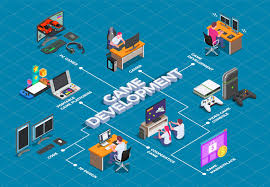info@gladsme.in
+91.8891968718
The Journey into Game Development: From Idea to Reality
The Journey into Game Development: From Idea to Reality

Welcome to our blog on game development, where we take you on a journey from the inception of a game idea to its final release. Whether you're an aspiring game developer or simply curious about the process, this guide will provide insights into the intricate and rewarding world of creating games.
1. Conceptualizing Your Game Idea
Every great game starts with an idea. Whether it's a thrilling adventure, a mind-bending puzzle, or a captivating story-driven experience, the first step in game development is defining what your game will be about. This stage involves brainstorming, sketching out concepts, and defining the core mechanics that will make your game unique.
2. Designing Gameplay and Mechanics
Once you have a clear concept, it's time to flesh out the gameplay mechanics. This involves mapping out how players will interact with your game, designing levels or environments, and balancing difficulty to ensure a challenging yet enjoyable experience. Tools like Unity, Unreal Engine, or even simpler frameworks like Godot can help bring your ideas to life.
3. Creating Art and Assets
Visuals play a crucial role in captivating players and bringing your game world to life. Whether you're designing characters, environments, or special effects, creating appealing art and assets is essential. Artists and designers use software like Adobe Photoshop, Blender, or Autodesk Maya to create 2D and 3D assets that fit the style and theme of the game.
4. Programming and Development
Behind every game is a foundation of code that makes it all work. Programming languages like C#, C++, or Python are commonly used to develop gameplay mechanics, implement AI behavior, manage physics, and create the overall structure of the game. This stage requires attention to detail and problem-solving skills to ensure everything runs smoothly.
5. Testing and Iteration
Testing is a crucial phase where developers gather feedback, identify bugs, and fine-tune gameplay elements. Playtesting with a variety of players helps ensure your game is enjoyable and balanced across different skill levels. Iteration based on feedback is key to refining the game and addressing any issues that arise.
6. Polish and Release
Once your game has undergone rigorous testing and iteration, it's time to polish it for release. This includes optimizing performance, refining visuals and sound effects, and preparing marketing materials. Platforms like Steam, App Store, or Google Play provide avenues for distribution, allowing you to share your creation with the world.
Game development is a challenging yet immensely rewarding journey. From initial concept to polished product, each stage brings its own set of joys and challenges. Whether you're a solo indie developer or part of a larger team, the process of creating games requires creativity, technical skill, and a passion for bringing virtual worlds to life.
Join us as we delve deeper into the world of game development, exploring topics like game design principles, industry trends, and the stories behind successful indie games. Get ready to embark on your own journey into the exciting realm of game creation!
Related Blogs

The Importance of Data Structures in Software Development
Read More...
Exploring Machine Learning Algorithms: A Beginner's Guide
Read More...
The Evolution of Programming Languages: From Assembly to Rust
Read More...
Understanding Big O Notation: A Guide for Developers
Read More...Subscribe for our Newsletter
Subscribe to elevate your software game! Stay updated on the latest trends, coding insights, and exclusive promotions with our newsletter.
